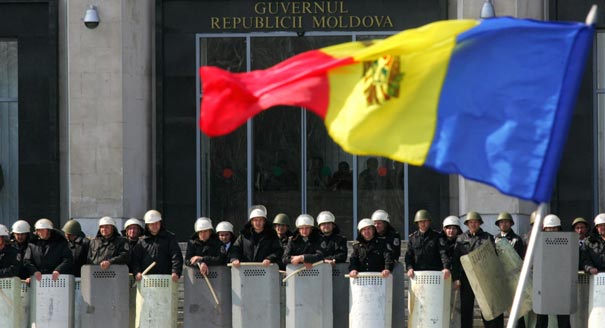In the run-up to the EU’s Eastern Partnership summit in Vilnius this November, Russia is piling on the pressure on its western neighbors to prevent them from moving closer to the EU.
Through a combination of threats and incentives, the Kremlin is trying to keep Belarus, Ukraine, Georgia, and Moldova—all members of the Eastern Partnership—from signing an association agreement with the EU in Vilnius. That accord would offer the region substantial trade, economic, and investment benefits linked to political reforms.
The EU offers Western values and the perspective of greater access to the EU’s internal market but not the prospect of membership. The Kremlin’s cards, however, are very powerful: through energy and trade, Russia has a strong hold over all four countries.
As fierce as the competition is between Russia and the EU over the future economic and political direction of the four former Soviet states, it is highly uneven.
Last month, Russia’s customs office began checks on all goods entering Russia from Ukraine. This has led to long delays and heavy losses for the Ukrainian side. And, of course, Russia can always raise the price Kiev has to pay for energy.
In neighboring Belarus, Russia is doing its utmost to undermine Belaruskali, Belarus’s highly lucrative potash company, in a bid to take it over. Having so far failed, Russia is now threatening to cut back its energy supplies to Belarus.
In Georgia, Russia has considerable leverage, especially through its support for the breakaway regions of South Ossetia and Abkhazia, which have proclaimed their independence since the 2008 Russia-Georgia war.
Now Moldova, Europe’s poorest country, has become the latest victim of Russia’s bullying. Last week, Dmitri Rogozin, Russia’s deputy prime minister and special envoy to the breakaway region of Transnistria, visited the country. “You have no idea of the pressure he tried to pile on,” said a senior Moldovan diplomat who requested anonymity, reflecting the tense political climate in his country. “He said it would be a serious and costly mistake if we concluded an agreement with the EU,” the diplomat added.
Rogozin threatened to cut Moldova’s trade with Russia, while Moldova’s migrant workers could face restrictions on entering Russia. He also said that by moving closer to Europe, Moldova would have to leave behind Transnistria, which is backed by Russia.
“Moldova’s train en route to Europe would lose its wagons in Transnistria,” Rogozin said during a press conference in the capital, Chişinău. Then he reminded his audience about how Moldova is completely dependent on Russia for its energy. “Energy is important,” Rogozin said. “The cold season is near. Winter is on its way. We hope that you will not freeze this winter.”
As a parting shot, Rogozin, a former ambassador to NATO, told a closed meeting that European integration was linked to integration with NATO.
“This is a blatant lie,” said the Moldovan diplomat. “But the wider public does not know this. Because support for NATO is low in Moldova, Rogozin is trying to undermine the pro-EU section of the population, which is between 50 percent and 55 percent,” the diplomat added.
This Russian pressure shows just how worried Moscow is about the EU’s democratizing influence, which is why so much is at stake at the Vilnius summit.
Moscow has already had pre-Vilnius victories. Armenia and Azerbaijan, the other two countries that belong to the Eastern Partnership, will not be signing the EU association agreement.
Armenia last week put its eggs in the Russian basket, believing it needed the Kremlin to guarantee its security. As for Azerbaijan, because of its vast energy resources, it has no interest in signing any such accord.
Yet if these two countries remain aloof from the EU, the pressure for democratization will be significantly diminshed. It will be a blow to their independent civil society and pro-Western movements. This is why Europe should fight much harder over countries like Moldova.
“What would really help the pro-European coalition government here is is a visa liberalization agreement with the EU,” said another Moldovan diplomat. Above all, he said, the EU has to promote itself much more actively in Moldova. “The EU should stop looking at Moldova through bureaucratic eyes. Surely it sees what is at stake,” he added.
What is true for Moldova goes for Ukraine, Belarus, and Georgia as well. For instance, if the EU could connect these countries to Europe’s energy grids, the Russian hold over this region would diminish radically. Plans to build a gas interconnector between Moldova and its EU neighbor Romania will take longer than expected, prolonging the Kremlin’s grip over Chişinău.
The EU could also use its Eastern Partnership more imaginatively to help modernize its Eastern neighbors’ health systems and to train their medical staff. It could grant young people access to the Europe’s universities. It could establish learning institutions in these countries and build or support independent television and radio networks.
In short, it is time the EU used its own values to take on Russia.








.jpg)